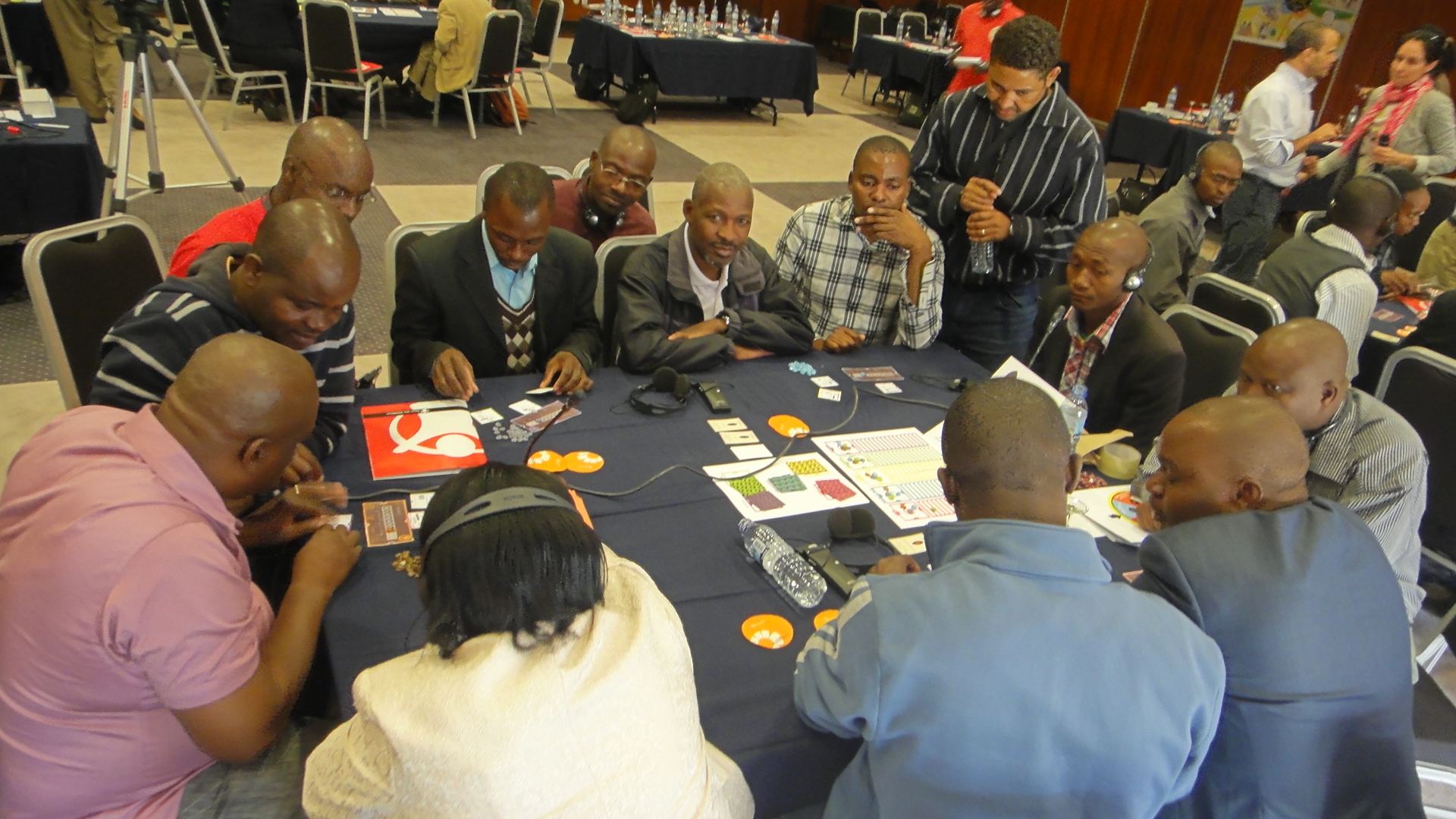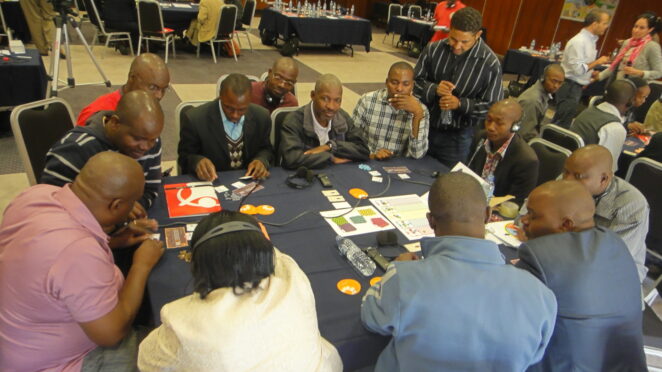Case-study /
Planning for the future and adapting to climate change in Mozambique – Lessons from ACCRA


Government and civil society members playing the ACCRA game in Maputo, Mozambique
Adaptation context
Mozambique is highly vulnerable to climate hazards, variability and change. More than 60% of the population live close to the country’s extensive coastline and are frequently affected by cyclones and storms. Inland floods are very common as large areas are below sea level and close to the numerous large rivers flowing to the Indian Ocean.Increasingly high temperatures and unpredictable rain put the 80% of the population who are dependent on rain-fed agriculture at risk. Infertile soils, endemic diseases, poor infrastructure, low literacy and rapid population growth compound the situation.
There are strong Government commitments to disaster risk reduction and climate change issues in the country. The INGC – the National Disaster Management Institution has a presence in most areas and has worked hard to reduce the risks communities face from floods and cyclones. In addition, most development strategies include commitments to Climate Change Adaptation.
Approach- Promoting Flexible and Forward-Looking Decision Making (FFDM)
ACCRA uses a set of research and capacity building tools to promote pro-poor and participatory climate change adaptation (CCA) and disaster risk reduction (DRR) in planning processes. Through engaging and supporting local communities, ACCRA seeks to help districts produce better plans in the face of future change and uncertainty.
ACCRA’s earlier work showed that policymakers face difficult trade-offs in planning for a changing and uncertain future. Yet many development actors continue to plan for the near- term, with little room for manoeuvre or contingency. ACCRA therefore chose to focus on one specific characteristic of adaptive capacity in order to help decision makers and planning better prepared for the future: Flexible and Forward-Looking Decision Making (FFDM).
The game-enabled reflection approach was tailored for district- level planners and developed into a two- to three-day workshop,held in Guijá District in Gaza province. At the same time, ACCRA undertook research to evaluate the effectiveness of this approach in promoting FFDM with district development planners in Mozambique.
Capacity building for development planning
ACCRA has used demand-driven capacity building through training and on-going support, to change the way people think about CCA, DRR and working with one another. To this end,it has produced, nationally relevant, evidence-based research and rolled out co-produced capacity building in partnership with the Mozambican government.
ACCRA has supported civil society coordination to provide policy inputs that reflect local experience and community perspectives. It does so through its consortium members in response to in- country opportunities and needs. ACCRA also involved local NGOs and CBOs in training, training of trainers and capacity building activities.
ACCRA has supported district government in view of local adaptation planning through a strong partnership with government representatives at district and national level. In particular, ACCRA has advised on best practice and guidance to develop the local adaptation plans. Through its relationship with government and its consortium members, ACCRA has shared lessons and best practice and built a strong network involving donors and academia.
Lessons learned
What has ACCRA learned from having conducted 4 years of research and capacity building in Mozambique? Below we described some of the key findings:
Local and national plans are focused on the near-term and even then don’t adequately plan and budget for emergencies for most sectors. They often fail to take a long-term perspective and recognise future change and uncertainty. District-level decision makers need tools that help them deal with complexity in a flexible manner and allow them to consider potential future threats – climate-related or otherwise.
Although communicating concepts such as uncertainty and FFDM can be difficult, a game-enabled reflection approach can help in communicating FFDM to development practitioners. But changing perceptions and institutional structures is a gradual process, requiring continuing support from development partners.
Identifying ‘champions of change’ is key for promoting FFDM and adaptation. Because adopting the principles of FFDM implies such a fundamental departure from business-as- usual ways of district planning and decision-making, the role of ‘champions of change’ is central to its success. In Guijá, the permanent secretary for the district was key to bringing this training and the related topics to her district, with support from the chief administrator. .
Political buy-in for FFDM works best where need is recognised.Flooding affected large areas of Mozambique duringthe course of ACCRA’s activities (originally meant for January 2013), causing a national disaster and requiring the postponement of the workshop by three months. This event is likely to have led to increased awareness of impacts of natural hazards, including awareness around possible future climate change impacts, and may have influenced the degree to which there was political buy- in to aspects of FFDM.
Opportunities do exist to do things differently. Despite inherent limitations in the rigidity of policy cycles and planning processes in Mozambique, there is always some flexibility. Even when strict targets are handed down from central government, district planners can often decide the specific modalities of implementation.
Recommendations
To enhance adaptive capacity and promote FFDM, many different actors will need to take action. ACCRA recommends that the following activities be instigated. For more detail please have a look at the full report.
District governments should exploit the opportunities to promote FFDM within constraints by:
-
Integrating CCA and DRR into implementation ofplans. For example, the budget received by Guijá district has remained the same but there are some new development priorities, such as the promotion of drought-resistant crops.
-
Seeking new ways of engaging with stakeholders.
-
Collaborating across and within different sectors and districts to pool resources and draw up contingency plans, and encouraging informal connections.
- Reflecting on where the district aims to be on time horizons beyond the traditional three- to five-year planning cycles.
National governments play a key role as they set the parameters for planning at all administrative levels:
- MICOA and MPD should encourage districts to develop longer-term strategies that incorporate principles of FFDM such that districts are free to define and shape their own development targets based on local needs and priorities.
- Greater coordination across sectors and ministries, including MICOA and MPD, and between different levels of government should be promoted, as well as engagement with CSOs. Participants in Guijá requested involvement of all stakeholders properly in the planning process, especially community leaders and representatives from sub-district and locality level.
Non-governmental andcivil society organisations should incorporate the principles of FFDM into their own policy and practice by;
-
Mobilising technical and financial resources topromote on going dialogue around FFDM.
- Promoting collaboration across boundaries – forexample in Guijá, community and sub-district officials and civil society representatives (e.g. pastors) werepresent at the ACCRA workshop.
Donors and multilateral agencies need to ensure the are responsive to changing priorities and unforeseen circumstances by:
- Enabling greater flexibility by moving away from target-based thinking to look for beneficial outcomes in the longer term.
- Adjusting funding timescales to provide incentives to consider and promote longer-term objectives within projects and programmes.
- Learn about ACCRA’s experiences in Ethiopia
- Learn about ACCRA’s experiences in Uganda
- Planning for an uncertain future: promoting adaptation to climate change through Flexible and Forward-looking Decision Making
- Blog – Young Mozambicans practice “forward-looking decision making”
ACCRA Mozambique
ACCRA in Mozambique is a consortium made up of Care International, Oxfam, World Vision, and is led by Save the Children. Its extended committee includes key government actors Ministry of Coordination of Environmental Affairs (MICOA) and the Ministry of Planning and Development (MPD).
